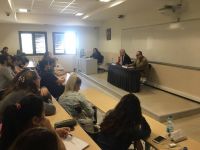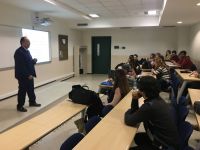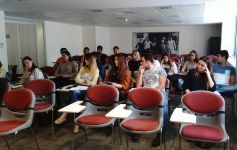
VOCATIONAL SCHOOL
Department of Banking and Insurance (Turkish)
MTOI 230 | Course Introduction and Application Information
| Course Name |
Consumer Behavior
|
|
Code
|
Semester
|
Theory
(hour/week) |
Application/Lab
(hour/week) |
Local Credits
|
ECTS
|
|
MTOI 230
|
Fall/Spring
|
3
|
0
|
3
|
5
|
| Prerequisites |
None
|
|||||
| Course Language |
Turkish
|
|||||
| Course Type |
Service Course
|
|||||
| Course Level |
Short Cycle
|
|||||
| Mode of Delivery | - | |||||
| Teaching Methods and Techniques of the Course | Group WorkLecture / Presentation | |||||
| Course Coordinator | - | |||||
| Course Lecturer(s) | ||||||
| Assistant(s) | - | |||||
| Course Objectives | The aim of this course is to gain an understanding regarding to the concepts and theories of consumer behavior. The aim is to inform students about main internal and external factors affecting the consumer buying behaviour and decisions. |
| Learning Outcomes |
The students who succeeded in this course;
|
| Course Description | The role of consumer behavior in marketing; consumer psychology, neuroscience, anthropology and sociology; consumer buying behavior and digital consumption and markets will be the main topics of the course. |
|
|
Core Courses | |
| Major Area Courses | ||
| Supportive Courses | ||
| Media and Management Skills Courses | ||
| Transferable Skill Courses |
WEEKLY SUBJECTS AND RELATED PREPARATION STUDIES
| Week | Subjects | Related Preparation |
| 1 | Introduction to the course | Lecture Notes |
| 2 | Consumption society and consumer culture | |
| 3 | Consumer behavior theory | |
| 4 | Consumer Psychology: Perception | Koç, E. (2012). Algılama. In Tüketici davranışı ve pazarlama stratejileri: Global ve yerel yaklaşım. İstanbul: Seçkin. |
| 5 | Consumer Psychology: Learning & Memory | Koç, E. (2012). Öğrenme ve hafıza. In Tüketici davranışı ve pazarlama stratejileri: Global ve yerel yaklaşım. İstanbul: Seçkin. |
| 6 | Consumer Psychology: Motivation & Involvement | Koç, E. (2012). Motivasyon ve İlgilenim. In Tüketici davranışı ve pazarlama stratejileri: Global ve yerel yaklaşım. İstanbul: Seçkin. |
| 7 | Consumer Psychology: Attitudes | Koç, E. (2012). Tutumlar. In Tüketici davranışı ve pazarlama stratejileri: Global ve yerel yaklaşım. İstanbul: Seçkin. |
| 8 | Midterm Exam | |
| 9 | Consumer Psychology: Self and Personality | Koç, E. (2012). Benlik ve kişilik. In Tüketici davranışı ve pazarlama stratejileri: Global ve yerel yaklaşım. İstanbul: Seçkin. |
| 10 | Consumer Neuroscience | Kılınç, O. E., & Yavuz, Ö. (2016). “Nöro pazarlama”ya giriş. İstanbul: Ortak İleişim. |
| 11 | Consumer anthropology: Values, lifestyles and culture | Kılınç, O. E., & Yavuz, Ö. (2016). “Nöro pazarlama”ya giriş. İstanbul: Ortak İleişim. |
| 12 | Consumer Sociology: Reference Groups, Family & Gender | Koç, E. (2012). Değerler, yaşam biçimleri ve kültür. In Tüketici davranışı ve pazarlama stratejileri: Global ve yerel yaklaşım. İstanbul: Seçkin. |
| 13 | Consumer purchase decision process | |
| 14 | Student presentations | |
| 15 | Review of the semester | |
| 16 | Final Exam |
| Course Notes/Textbooks | Koç, E. (2012). Tüketici davranışı ve pazarlama stratejileri: Global ve yerel yaklaşım. İstanbul: Seçkin. |
| Suggested Readings/Materials | Kılınç, O. E., & Yavuz, Ö. (2016). “Nöro pazarlama”ya giriş. İstanbul: Ortak İleişim. |
EVALUATION SYSTEM
| Semester Activities | Number | Weigthing |
| Participation |
1
|
10
|
| Laboratory / Application | ||
| Field Work | ||
| Quizzes / Studio Critiques | ||
| Portfolio | ||
| Homework / Assignments | ||
| Presentation / Jury |
1
|
20
|
| Project | ||
| Seminar / Workshop | ||
| Oral Exams | ||
| Midterm |
1
|
30
|
| Final Exam |
1
|
40
|
| Total |
| Weighting of Semester Activities on the Final Grade |
3
|
60
|
| Weighting of End-of-Semester Activities on the Final Grade |
1
|
40
|
| Total |
ECTS / WORKLOAD TABLE
| Semester Activities | Number | Duration (Hours) | Workload |
|---|---|---|---|
| Theoretical Course Hours (Including exam week: 16 x total hours) |
16
|
3
|
48
|
| Laboratory / Application Hours (Including exam week: '.16.' x total hours) |
16
|
0
|
|
| Study Hours Out of Class |
15
|
3
|
45
|
| Field Work |
0
|
||
| Quizzes / Studio Critiques |
0
|
||
| Portfolio |
0
|
||
| Homework / Assignments |
0
|
||
| Presentation / Jury |
1
|
15
|
15
|
| Project |
0
|
||
| Seminar / Workshop |
0
|
||
| Oral Exam |
0
|
||
| Midterms |
1
|
20
|
20
|
| Final Exam |
1
|
22
|
22
|
| Total |
150
|
COURSE LEARNING OUTCOMES AND PROGRAM QUALIFICATIONS RELATIONSHIP
|
#
|
Program Competencies/Outcomes |
* Contribution Level
|
||||
|
1
|
2
|
3
|
4
|
5
|
||
| 1 | To be able to explain the economic situations by analyzing the concepts of the economic, the general functioning of the system and the relationship between the elements of the system and the economic phenomena |
|||||
| 2 | To be able to discuss the role, importance and functions of the institutions providing banking and insurance services in the economic system |
|||||
| 3 | To be able to apply the principles and methods related to the services and products offered by banking and insurance companies considering the types of these companies |
|||||
| 4 | To be able to define the risk factor which is an important element of the financial system and to use the financial instruments to manage the risk and benefit form the opportunities |
|||||
| 5 | To be able to develop the skills necessary for marketing and sales of financial products |
X | ||||
| 6 | To have the general knowledge about laws and specific legislation about bank, insurance, capital markets and foreign exchange |
|||||
| 7 | To be able to analyze financial statements like balance sheet and income statement and to be able to register, correct and close the financial transactions in the related accounting records within the accounting cycle |
|||||
| 8 | To be able to develop the analytical thinking skills required for the solution of professional problems and applies the rules of mathematics and logic |
|||||
| 9 | To be able to make decisions based on the principles of professional ethics, accountability and responsibility |
|||||
| 10 | To be able to use the english at the general level of European Language Portfolio A2 to communicate effectively with his / her colleagues and to follow up necessary professional sources in his/her field |
|||||
| 11 | To have the ability to work effectively in individual and multi-disciplinary teams and to use them in their work environment |
|||||
| 12 | To have a broad perspective on social and academic aspects by closely following the developments in various different subjects in or out of the scope of his/her profession |
X | ||||
| 13 | To be able to direct his/her education to a further level of education |
|||||
*1 Lowest, 2 Low, 3 Average, 4 High, 5 Highest






